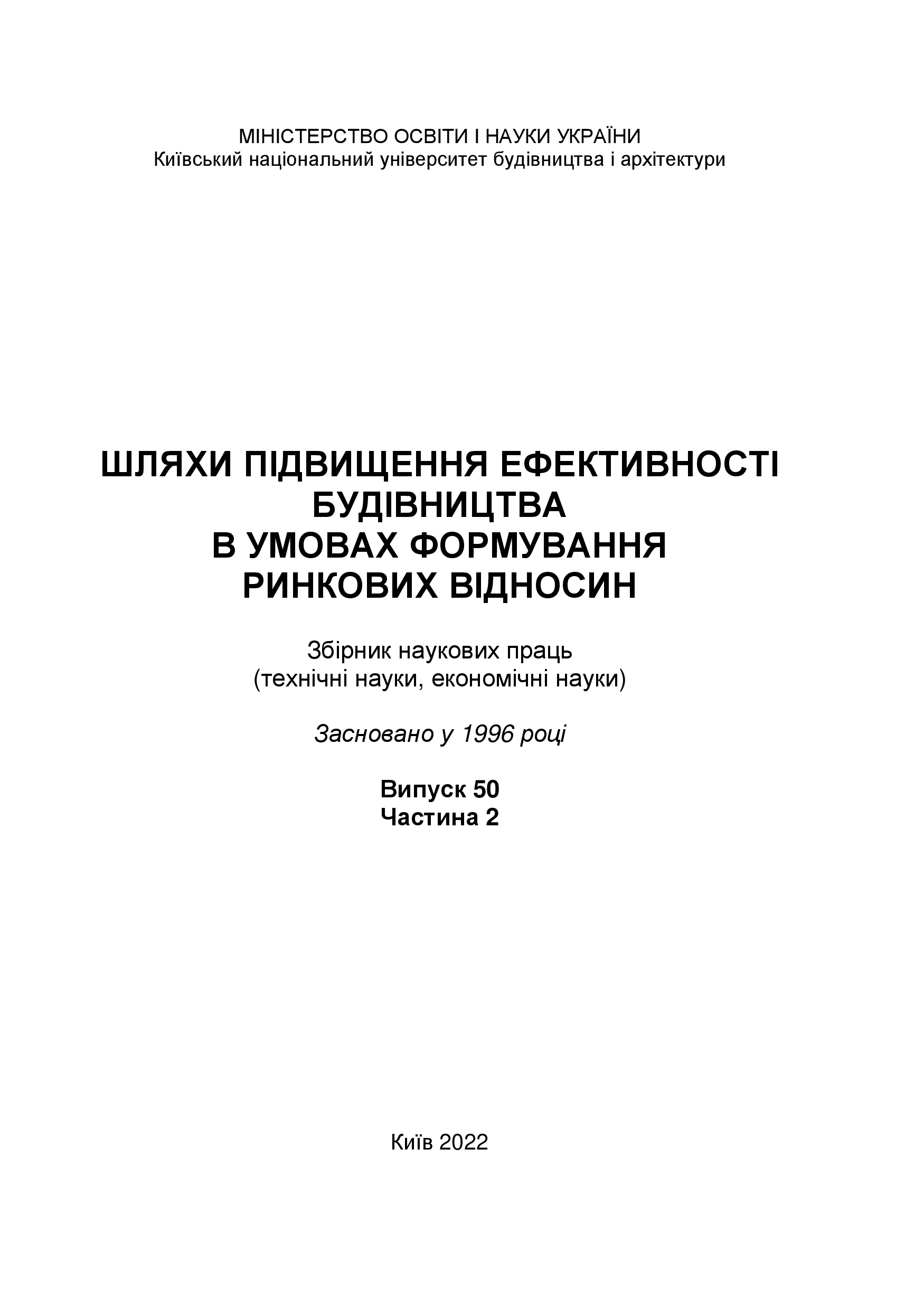Intellectual capital as a factor of innovative sustainable development
DOI:
https://doi.org/10.32347/2707-501x.2022.50(2).281-291Keywords:
sustainable development, intellectual capital, innovative development, innovations, personnel, construction enterprise, construction sector of the economy, constructionAbstract
The article examines the genesis of the concept of "sustainable development" and its influence on the sustainable development of intellectual capital. It was determined that the development of intellectual capital contributes to the realization of all the Sustainable Development Goals (SDGs), providing the necessary knowledge, skills, innovations and opportunities to solve the world's most pressing sustainable development problems. Intellectual capital is a valuable resource for promoting economic, social and environmental progress, comprehensively balanced development of society. Intellectual capital plays a key role in achieving both individual targets and the overall SDGs by 2030.
The study of the impact of intellectual capital on the achievement of the Sustainable Development Goals is of great relevance and importance, as it provides valuable information on how human knowledge, skills and experience can be used to address complex, interconnected global challenges. Understanding this relationship allows us to develop more effective strategies and actions to promote sustainable development and create a better future for all.
As a result of the analysis, it was found that the implementation of all seventeen Sustainable Development Goals depends on the influence of intellectual capital. At the same time, the so-called "spiral effect" arises, when the development of intellectual capital will contribute to the achievement of such goals as gender equality, decent work and economic growth, quality education, poverty alleviation, development of industry, innovation and infrastructure, reduction of inequality, sustainable development of cities and communities , in turn, the achievement of these goals will create favorable conditions for the growth of intellectual capital, becoming an impetus for its further development. Such an approach to the description of progressive growth not only corresponds to the principles of comprehensively balanced development, but will also allow creating a model of the influence of the components of intellectual capital on the development of an enterprise, industry, sector of the economy or the economic system as a whole..
References
Порядок денний на ХХІ століття”: Програма дій ухвалена конференцією ООН з навколишнього середовища і розвитку в Ріо-де-Жанейро (Саміт “Планета Земля”, 1992 р.): пер. з англ. 2-ге вид. К.: Інтелсфера, 2000. 360 с.
Report of the World Commission on Environment and Development: Our Common Future. 1987. Oxford ; New York : Oxford University Press. 300 р. https://sustainabledevelopment.un.org/content/documents/5987our-common-future.pdf
Амоша О. І., Джвігол Х., Мішкєвіч Р. Інноваційне промислове підприємство в формуванні сталого розвитку: монографія. Київ : Інститут економіки промисловості НАН України, 2018. 296 с.
Інноваційна економіка в глобалізованому світі: інституціональний базис формування та траєкторія розвитку: монографія. Київ : Аграр Медіа Груп, 2019. 492 с.
Гейць В. М. Інноваційна Україна 2020 : національна доповідь. Київ: НАН України, 2015. 336 с
Яворська О. Інтелектуальний капітал як каталізатор процесів інтелектуалізації праці біоекономіки: європейський досвід Galician economik journal, No 4 (65) 2020 https://doi.org/10.33108/galicianvisnyk_tntu2020.04
Монографія «Людський капітал України: стан, проблеми, перспективи відтворення» / За ред.: В. М. Лича. Київ: КНУБА, 2009. 152 с.
Економіка інтелектуального капіталу: сутність та особливості формування у будівництві. Колективна монографія. / за заг.ред. В.М. Лича. КНУБА. К.: 2017. 196 с.
Згалат-Лозинська Л. О. Державно-управлінський механізм формування банку інтелектуально-інноваційного капіталу. Приазовський економічний вісник. 2020. № 4(21). URL: http://pev.kpu.zp.ua/vypusk-21
Згалат-Лозинська Л.О. Державне регулювання формування інтелектуально-інноваційного капіталу у будівництві. Проблеми системного підходу в економіці. 2020. Вип. 4(78). URL: http://psae-jrnl.nau.in.ua/78-20206.
Гончаров В.В. Інтелектуальний капітал: проблеми формування та використання в Україні. Тези на Міжнародної конференції “Innovative development of science and education”. 26-28 April 2020, ATHENS, Greece. с. 507-515
Головаш Б.Е., Головаш Л.В. Особливості оцінки інтелектуального капіталу на Мікро- та Макро рівнях. Шляхи підвищення ефективності будівництва в умовах формування ринкових відносин. Вип.40. (Економічний), 2019. С.51-57.https://naqa-my.sharepoint.com/:b:/g/personal/ vlych_naqa_gov_ua/EatftT56EYRIkOXEEhiJKgsBtgfBwEVzC77OdOFCuz_nuw?e=veW17a
Лич В.М., Заєць О.С. Формування пріоритетів системного стимулювання людського капіталу будівельних підприємств. Економічний вісник університету., 2018. Вип. 36/1. С. 86-94
Пунда О. О., Арзянцева Д. А., Захаркевич Н. П. Теоретична сутність та компонентна структура інтелектуального капіталу підприємства. Наука, технології, інновації, 2021. № 3.. С.10-19.
Проскуріна Н. М., Дядюн О. О. Інтелектуальний капітал та нематеріальні активи підприємства: підходи до розмежування дефініцій. Науковий вісник Херсонського державного університету. 2016. Вип. 21. Ч. 1. С. 181–185.
Ізмайлова К.В. Вплив нематеріальних активів, інтелектуальної складової іх власності, технічних засобів іт підприємства на темпи зростання чистого доходу. Будівельне виробництво. 2016. № 61-2.
Шапошнікова І.О. Сучасні аспекти інноваційного розвитку будівельних підприємств. Шляхи підвищення ефективності будівництва в умовах формування ринкових відносин. 2021. № 47 (2). С. 40-47.
Оліферук С.Л. Комплексна оцінка рівня інноваційного розвитку підприємства. Шляхи підвищення ефективності будівництва в умовах формування ринкових відносин. 2021. № 47 (2). С. 110-119.
Downloads
Published
How to Cite
Issue
Section
License

This work is licensed under a Creative Commons Attribution 4.0 International License.
Authors who publish with this journal agree to the following terms:
- Authors retain copyright and grant the journal right of first publication with the work simultaneously licensed under a Creative Commons Attribution License that allows others to share the work with an acknowledgement of the work's authorship and initial publication in this journal.
- Authors are able to enter into separate, additional contractual arrangements for the non-exclusive distribution of the journal's published version of the work (e.g., post it to an institutional repository or publish it in a book), with an acknowledgement of its initial publication in this journal.
- Authors are permitted and encouraged to post their work online (e.g., in institutional repositories or on their website) prior to and during the submission process, as it can lead to productive exchanges, as well as earlier and greater citation of published work (See The Effect of Open Access).

